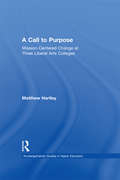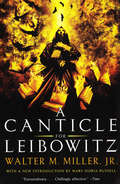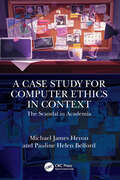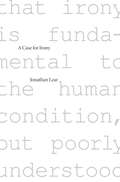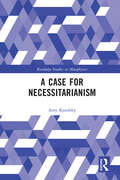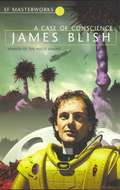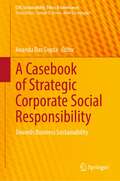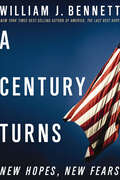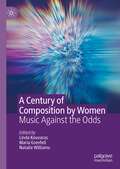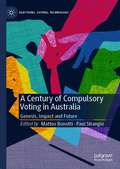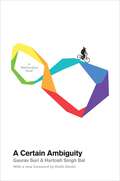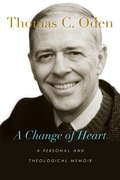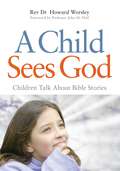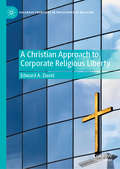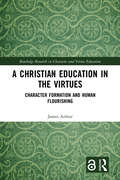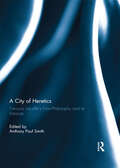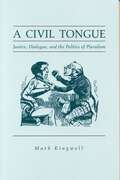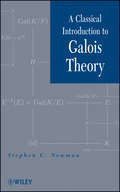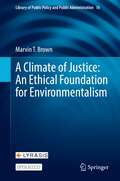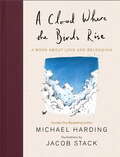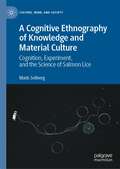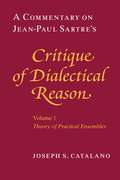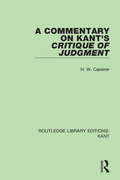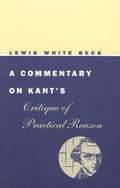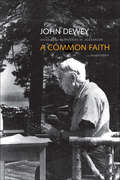- Table View
- List View
A Call to Purpose: Mission-Centered Change at Three Liberal Arts Colleges (RoutledgeFalmer Studies in Higher Education)
by Matthew HartleyA decade ago, the majority of liberal arts colleges, suffering from a decline in resources, drifted from their traditional missions. This study looks at three insitutions and suggests that a clear mission is more than a common goal.
A Canticle for Leibowitz
by Walter M. Miller Jr.The Flame Deluge was over, the earth was dead and all knowledge has been eradicated. In a desert, a monk unearths a link to 20th-century civilization, and with his colleagues, vows to preserve the ancient knowledge until mankind is ready to receive it.<P><P> Hugo Award winner.
A Case Study for Computer Ethics in Context: The Scandal in Academia
by Michael James Heron Pauline Helen BelfordAimed at addressing the difficulties associated with teaching often abstract elements of technical ethics, this book is an extended fictional case study into the complexities of technology and social structures in complex organizations. Within this case study, an accidental discovery reveals that the algorithms of Professor John Blackbriar are not quite what they were purported to be. Over the course of 14 newspaper articles, a nebula of professional malpractice and ethical compromise is revealed, ultimately destroying the career of a prominent, successful academic.The case study touches on many topics relevant to ethics and professional conduct in computer science, and on the social structures within which computer science functions. Themes range from the growing influence of generative AI to the difficulties in explaining complex technical processes to a general audience, also touching on the environmental consequences of blockchain technology and the disproportionate gender impacts of Coronavirus. Each new revelation in the case study unveils further layers of complexity and compromise, leading to new technical and social issues that need to be addressed.Directly aimed at making ethics in the digital age accessible through the use of real-world examples, this book appeals to computer science students at all levels of the educational system, as well as making an excellent accompaniment to lecturers and course convenors alike.
A Case for Irony (The Tanner lectures on human values #13)
by Jonathan LearIn 2001, Vanity Fair declared that the Age of Irony was over. Joan Didion has lamented that the United States in the era of Barack Obama has become an "irony-free zone." Jonathan Lear in his 2006 book Radical Hope looked into America’s heart to ask how might we dispose ourselves if we came to feel our way of life was coming to an end. Here, he mobilizes a squad of philosophers and a psychoanalyst to once again forge a radical way forward, by arguing that no genuinely human life is possible without irony. Becoming human should not be taken for granted, Lear writes. It is something we accomplish, something we get the hang of, and like Kierkegaard and Plato, Lear claims that irony is one of the essential tools we use to do this. For Lear and the participants in his Socratic dialogue, irony is not about being cool and detached like a player in a Woody Allen film. That, as Johannes Climacus, one of Kierkegaard’s pseudonymous authors, puts it, “is something only assistant professors assume.” Instead, it is a renewed commitment to living seriously, to experiencing every disruption that shakes us out of our habitual ways of tuning out of life, with all its vicissitudes. While many over the centuries have argued differently, Lear claims that our feelings and desires tend toward order, a structure that irony shakes us into seeing. Lear’s exchanges with his interlocutors strengthen his claims, while his experiences as a practicing psychoanalyst bring an emotionally gripping dimension to what is at stake—the psychic costs and benefits of living with irony.
A Case for Necessitarianism (Routledge Studies in Metaphysics)
by Amy KarofskyThis book is the first detailed and focused defense of necessitarianism. The author’s original account of necessitarianism encourages a re-examination of commonly held metaphysical positions as well as important issues in other, related areas of philosophy. Necessitarianism is the view that absolutely nothing about the world could have been otherwise in any way, whatsoever. Most philosophers believe that necessitarianism is just plain false and presume that some things could have been otherwise than what they are. In this book, the author argues that necessitarianism is true and the view that some things in the world are contingent—what the author terms contingentarianism—is false. The author assesses various theories of contingency, including the possible worlds theory, combinatorialism, and dispositionalism and argues that no theory can successfully explain why an entity is such as it is rather than not. She then lays out a case for necessitarianism and provides responses to various objections. The book concludes with an explanation of the ways in which necessitarianism is relevant to issues in ethics, philosophy of mind, and social philosophy. A Case for Necessitarianism will be of interest to scholars and advanced students working in metaphysics, logic, and philosophy of science.
A Case of Conscience
by James BlishFather Ruiz-Sanchez is a dedicated man -- a priest who is also a scientist, and a scientist who is also a human being. He has found no insoluble conflicts in his beliefs or his ethics... until he is sent to Lithia. There he comes upon a race of aliens who are admirable in every way except for their total reliance on cold reason; they are incapable of faith or belief.<P><P> Confronted with a profound scientific riddle and ethical quandary, Father Ruiz-Sanchez soon finds himself torn between the teachings of his faith, the teachings of his science, and the inner promptings of his humanity. There is only one solution: He must accept an ancient and unforgivable heresy -- and risk the futures of both worlds.<P> Hugo Award Winner.
A Casebook of Strategic Corporate Social Responsibility: Towards Business Sustainability (CSR, Sustainability, Ethics & Governance)
by Ananda Das GuptaThis casebook argues that corporate sustainability agendas should look beyond stakeholder demands and desires, towards strategic opportunities to achieve social and commercial benefits simultaneously. It encourages shifting focus from a strategic approach to a sustainable business practice. As the cases in the book highlight, it is in every company’s best interest to identify a manageable number of sustainability initiatives whose shared benefits—for society at large and the company—are significant and also substantially help the company strategically position itself in the competitive marketplace. Strategic sustainable business practices can lead to shared value creation, strengthening the company’s competitiveness and establishing a symbiotic relationship. Companies can achieve solid profits by doing good things for the environment; it is a “win-win” for society and for business. This casebook provides examples of multi-stakeholder partnerships that aim to create sustainable enterprises. Ideal for teaching purposes, after a brief introduction to the case method, the cases are presented with no comments or criticisms.
A Century Turns: New Hopes, New Fears
by William J. BennettA state of the union address as the twentieth century turned into the twenty-first—from the New York Times–bestselling author of America, the Last Best Hope.In A Century Turns, William J. Bennett explores America’s recent and momentous history—the contentious election of 1988, the fall of the Berlin Wall and the collapse of global Communism, the presidency of William Jefferson Clinton, the technological and commercial boom of the 1990s, the war on terror, and the election of America’s first black president.Surveying politics and pop culture, economics and technology, war and religion, Bennett pieces together the players, the personalities, the feats and the failures that transformed key moments in the American story. And he captures it all with piercing insight and unrelenting optimism.
A Century of Composition by Women: Music Against the Odds
by Natalie Williams Linda Kouvaras Maria GrenfellThis book presents accounts of creative processes and contextual issues of current-day and early-twentieth century women composers. This collection of essays balances narratives of struggle, artistic prowess, and of "breaking through" the obstacles in the profession. Part I: Creative Work – Then and Now illuminates historical and present-day women’s composition and various iterations and conceptions of the “feminine voice”; Part II: The State of the Industry in the Present Day provides solutions from the frontline to sector inequities; and Part III: Creating; Collaborating: Composer and Performer Reflections offers personal stories of current creation in music. A Century of Composition by Women: Music Against the Odds draws together topical issues in feminist musicology over the past century. This volume provides insight into the professional and compositional procedures of creative women in music and stands to be relevant for composers, performers, industry professionals, students, and feminist and musicological scholars for many years to come.
A Century of Compulsory Voting in Australia: Genesis, Impact and Future (Elections, Voting, Technology)
by Matteo Bonotti Paul StrangioCompulsory voting has operated in Australia for a century, and remains the best known and arguably the most successful example of the practice globally. By probing that experience from several disciplinary perspectives, this book offers a fresh, up-to-date insight into the development and distinctive functioning of compulsory voting in Australia. By juxtaposing the Australian experience with that of other representative democracies in Europe and North America, the volume also offers a much needed comparative dimension to compulsory voting in Australia. A unifying theme running through this study is the relationship between compulsory voting and democratic well-being. Can we learn anything from Australia’s experience of the practice that is instructive for the development of institutional bulwarks in an era when democratic politics is under pressure globally? Or is Australia’s case sui generis – best understood in the final analysis as an intriguing outlier?
A Certain Ambiguity: A Mathematical Novel
by Gaurav Suri Hartosh Singh BalWhile taking a class on infinity at Stanford in the late 1980s, Ravi Kapoor discovers that he is confronting the same mathematical and philosophical dilemmas that his mathematician grandfather had faced many decades earlier--and that had landed him in jail. Charged under an obscure blasphemy law in a small New Jersey town in 1919, Vijay Sahni is challenged by a skeptical judge to defend his belief that the certainty of mathematics can be extended to all human knowledge--including religion. Together, the two men discover the power--and the fallibility--of what has long been considered the pinnacle of human certainty, Euclidean geometry. As grandfather and grandson struggle with the question of whether there can ever be absolute certainty in mathematics or life, they are forced to reconsider their fundamental beliefs and choices. Their stories hinge on their explorations of parallel developments in the study of geometry and infinity--and the mathematics throughout is as rigorous and fascinating as the narrative and characters are compelling and complex. Moving and enlightening, A Certain Ambiguity is a story about what it means to face the extent--and the limits--of human knowledge.
A Change of Heart: A Personal and Theological Memoir
by Thomas C. OdenPreaching's2014 Best Theological Memoir from Byron Borger, Hearts and Minds BookstoreAncient Christian Commentary on Scripture.
A Child Sees God: Children Talk About Bible Stories
by John Hull Howard WorsleyIn A Child Sees God, Howard Worsley explores how we can all learn from a child's perspective of the world and shows how a child's eye view of the Bible reveals many interesting ideas about ethics and morality, and provides new ways of understanding these ancient stories. By asking families to read Bible stories to their children and discuss these stories with them, recording the ensuing conversations, Howard Worsley offers not only fresh insights into the meaning and significance of these stories but also reflections on how adults can use the Biblical text in the company of children at different stages of development. Following the theory that all stories ever written fall into one of seven categories, this book shows that the themes of the Bible are no different, dividing stories into sections containing texts of wonder, adventure and leadership, terror, justice and judgement, comfort and hope, comedy, and mercy and forgiveness. This fresh look at the Bible through the eyes of children will be a fascinating read for parents, teachers, ministers, and anyone with an interest in child spirituality or ethics.
A Christian Approach to Corporate Religious Liberty (Palgrave Frontiers in Philosophy of Religion)
by Edward A. DavidThis book addresses one of the most urgent issues in contemporary American law—namely, the logic and limits of extending free exercise rights to corporate entities. Pointing to the polarization that surrounds disputes like Burwell v. Hobby Lobby, David argues that such cases need not involve pitting flesh-and-blood individuals against the rights of so-called “corporate moral persons.” Instead, David proposes that such disputes should be resolved by attending to the moral quality of group actions. This approach shifts attention away from polarizing rights-talk and towards the virtues required for thriving civic communities. More radically, however, this approach suggests that groups themselves should not be viewed as things or “persons” in the first instance, but rather as occasions of coordinated activity. Discerned in the writings of Saint Thomas Aquinas, this reconceptualization helps illuminate the moral stakes of a novel—and controversial—form of religious freedom.
A Christian Education in the Virtues: Character Formation and Human Flourishing (Routledge Research in Character and Virtue Education)
by James ArthurA Christian Education in the Virtues examines the connection between human nature and human flourishing. It draws on ancient and medieval sources to explore the formation of the person based on a Christian anthropology, emphasising the communal nature of the virtuous life and provides a richer approach to the question of contemporary character education. The book argues that the only way to understand and construct our character virtues is to have a clear picture of what is the purpose and meaning of human life. It highlights the importance of engaging with moral issues and makes the case that, for Christian educators, human flourishing is inseparable from God’s active relationship to human beings. The book also explores a teleological approach to character education goals. To educate the whole person in the light of an all-embracing Christian worldview is challenged by secular and liberal ideology and is often seen as irrational to the modern mind. Overall, the text seeks to demonstrate that many aspects of a Neo-Aristotelian-Thomist theoretical underpinning for Christian character education holds out a viable option for Christians. It therefore argues the case for the educational potential of Christian character education. This important book will be essential reading for academics, researchers and students in the fields of character and virtue education, religious education and the philosophy of education.
A City of Heretics: François Laruelle's Non-Philosophy and its variants (Angelaki: New Work in the Theoretical Humanities)
by Anthony Paul SmithFrançois Laruelle has been developing his project of non-philosophy since the 1970s. Throughout this time he has aimed at nothing less than the discovery and development of a new form of thinking that draws its material from philosophy and related disciplines, but uses them in inventive new ways that are seen as heretical by standard philosophical approaches. The contributions to this volume highlight Laruelle’s own distinctive approach to the history of thought and bring together researchers in the Anglophone and Francophone world who have taken up the project of non-philosophy in their own way, developing new heresies, sometimes even in relation to non-philosophy itself. The contributions here show the scope of non-philosophy with essays on gender, science, religion, politics, animals, and the history of philosophy. They are all brought together, not in a city of intellectuals bound together by law, but within a city of heretics bound together only by their status as stranger. This book was originally published as a special issue of Angelaki.
A Civil Tongue: Justice, Dialogue, and the Politics of Pluralism (G - Reference, Information and Interdisciplinary Subjects)
by Mark KingwellThis book is about a widely shared desire: the desire among citizens for a vibrant and effective social discourse of legitimation. It therefore begins with the conviction that what political philosophy can provide citizens is not further theories of the good life but instead directions for talking about how to justify the choices they make—or, in brief, "just talking."As part of the general trend away from the aridity of Kantian universalism in political philosophy, thinkers as diverse as Bruce Ackerman, Jürgen Habermas, Alasdair MacIntyre, and Richard Rorty have taken a "dialogic turn" that seeks to understand the determination of principles of justice as a cooperative task, achieved in some kind of social dialogue among real citizens. In one way or another, however, each of these different variations on the dialogic model fail to provide fully satisfactory answers, Mark Kingwell shows. Drawing on their strengths, he presents another model he calls "justice as civility," which makes original use of the popular literature on etiquette and work in sociolinguistics to develop a more adequate theory of dialogic justice.
A Classical Introduction to Galois Theory
by Stephen C. NewmanExplore the foundations and modern applications of Galois theory Galois theory is widely regarded as one of the most elegant areas of mathematics. A Classical Introduction to Galois Theory develops the topic from a historical perspective, with an emphasis on the solvability of polynomials by radicals. The book provides a gradual transition from the computational methods typical of early literature on the subject to the more abstract approach that characterizes most contemporary expositions. The author provides an easily-accessible presentation of fundamental notions such as roots of unity, minimal polynomials, primitive elements, radical extensions, fixed fields, groups of automorphisms, and solvable series. As a result, their role in modern treatments of Galois theory is clearly illuminated for readers. Classical theorems by Abel, Galois, Gauss, Kronecker, Lagrange, and Ruffini are presented, and the power of Galois theory as both a theoretical and computational tool is illustrated through: A study of the solvability of polynomials of prime degree Development of the theory of periods of roots of unity Derivation of the classical formulas for solving general quadratic, cubic, and quartic polynomials by radicals Throughout the book, key theorems are proved in two ways, once using a classical approach and then again utilizing modern methods. Numerous worked examples showcase the discussed techniques, and background material on groups and fields is provided, supplying readers with a self-contained discussion of the topic. A Classical Introduction to Galois Theory is an excellent resource for courses on abstract algebra at the upper-undergraduate level. The book is also appealing to anyone interested in understanding the origins of Galois theory, why it was created, and how it has evolved into the discipline it is today.
A Climate of Justice: An Ethical Foundation for Environmentalism (Library of Public Policy and Public Administration #16)
by Marvin T. BrownThis open access book helps readers combine history, politics, and ethics to address the most pressing problem facing the world today: environmental survival. In A Climate of Justice, Marvin Brown connects the environmental crisis to basic questions of economic, social, and racial justice. Brown shows how our current social climate maintains systemic injustices, and he uncovers resources for change through a civic ethics of repair and reciprocity. A must-read for researchers and educators in the area of environmental ethics and those teaching courses in the fields of public policy and environmental sustainability. With the support of more than 30 libraries, the LYRASIS United Nations Sustainable Development Goals Fund has enabled this publication related to SDG13 (Climate Action) to be available fully open access.
A Cloud Where the Birds Rise: A book about love and belonging
by Michael Harding Jacob StackPlease note this has been optimised for display on tablets and colour devices.In this stunning collaboration, bestselling writer Michael Harding's most memorable musings on the human condition are brought to life by illustrator Jacob Stack.In these pages, the reader is held in moments of belonging, solitude, love and healing as we witness the beauty of falling snow, the pain and love of goodbyes, and the shared lives and deaths of neighbours amid the sweeping landscape of Ireland.A Cloud Where the Birds Rise is a beautifully illustrated collection of observations and stories from one of Ireland's best-loved writers - a celebration of finding beauty and hope in the ordinary.
A Cognitive Ethnography of Knowledge and Material Culture: Cognition, Experiment, and the Science of Salmon Lice (Culture, Mind, and Society)
by Mads SolbergThis cognitive ethnography examines how scientists create meaning about biological phenomena through experimental practices in the laboratory, offering a frontline perspective on how new insights come to life. An exercise in the anthropology of knowledge, this story follows a community of biologists in Western Norway in their quest to build a novel experimental system for research on Lepeoptheirus salmonis, a parasite that has become a major pest in salmon aquaculture. The book offers a window on the making of this material culture of science, and how biological phenomena and their representations are skillfully transformed and made meaningful within a rich cognitive ecology. Conventional accounts of experiments see their purpose as mainly auxiliary, as handmaidens to theory. By looking closely at experimental activities and their materiality, this book shows how experimentation contributes to knowledge production through a broader set of epistemic actions.In drawing on a combination of approaches from anthropology and cognitive science, it offers a unique contribution to the fields of cultural psychology, psychological anthropology, science and technology studies and the philosophy of science.
A Commentary on Jean-Paul Sartre's Critique of Dialectical Reason: Theory Of Practical Ensembles (Theory of Practical Ensembles)
by Joseph S. CatalanoSartre’s Critique of Dialectical Reason ranks with Being and Nothingness as a work of major philosophical significance, but it has been largely neglected. The first volume, published in 1960, was dismissed as a Marxist work at a time when structuralism was coming into vogue; the incomplete second volume has only recently been published in France. In this commentary on the first volume, Joseph S. Catalano restores the Critique to its deserved place among Sartre’s works and within philosophical discourse as a whole. Sartre attempts one of the most needed tasks of our times, Catalano asserts—the delivery of history into the hands of the average person. Sartre’s concern in the Critique is with the historical significance of everyday life. Can we, he asks, as individuals or even collectively, direct the course of our history? A historical context for our lives is given to us at birth, but we sustain that context with even our most mundane actions—buying a newspaper, waiting in line, eating a meal. In looking at history, Sartre argues, reason can never separate the historical situation of the investigator from the investigation. Thus reason falls into a dialectic, always depending upon the past for guidance but always being reshaped by the present. Clearly showing the influence of Marx on Sartre’s thought, the Critique adds the historical dimension lacking in Being and Nothingness. In placing the Critique within the corpus of Sartre’s philosophical writings, Catalano argues that it represents a development rather than a break from Sartre’s existentialist phase. Catalano has organized his commentary to follow the Critique and has supplied clear examples and concrete expositions of the most difficult ideas. He explicates the dialogue between Marx and Sartre that is internal to the text, and he also discusses Sartre’s Search for Method, which is published separately from the Critique in English editions.
A Commentary on Kant's Critique of Judgement (Routledge Library Editions: Kant)
by H. W. CassirerThis book expounds Kant's Critique of Judgement by interpreting all the details in the light of what Kant himself declares to be his fundamental problem. Providing an excellent introduction to Kant's third critique, it will be of interest to students of philosophy.
A Commentary on Kants Critique of Practical Reason
by Lewis Beck<p>When this work was first published in 1960, it immediately filled a void in Kantian scholarship. It was the first study entirely devoted to Kant's Critique of Practical Reason and by far the most substantial commentary on it ever written. This landmark in Western philosophical literature remains an indispensable aid to a complete understanding of Kant's philosophy for students and scholars alike. <p>This Critique is the only writing in which Kant weaves his thoughts on practical reason into a unified argument. Lewis White Beck offers a classic examination of this argument and expertly places it in the context of Kant's philosophy and of the moral philosophy of the eighteenth century.</p>
A Common Faith
by John Dewey Thomas M. AlexanderIn "A Common Faith, " eminent American philosopher John Dewey calls for the "emancipation of the true religious quality" from the heritage of dogmatism and supernaturalism that he believes characterizes historical religions. He describes how the depth of religious experience and the creative role of faith in the resources of experience to generate meaning and value can be cultivated without making cognitive claims that compete with or contend with scientific ones. <P><P> In a new introduction, Dewey scholar Thomas M. Alexander contextualizes the text for students and scholars by providing an overview of Dewey and his philosophy, key concepts in "A Common Faith, " and reactions to the text.
